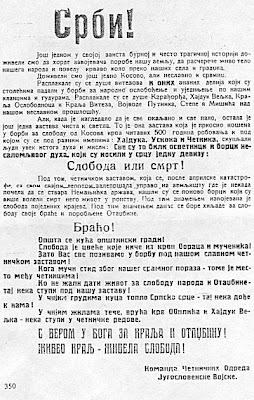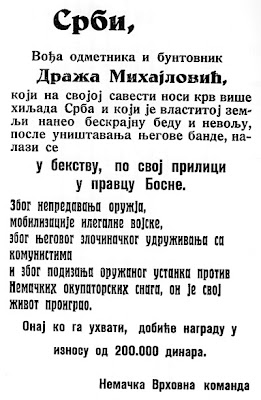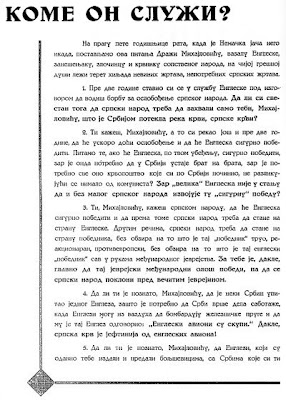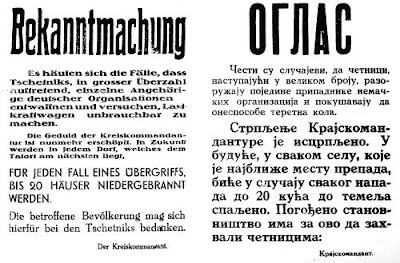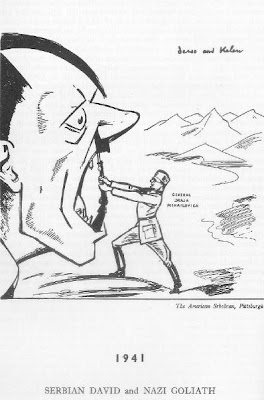A German memorandum states that the German-Partisan conversation took place in Gornji Vakuf (west of Sarajevo) on March 11, 1943, from 9:30 to 11 A.M. . . . During the March discussions, the Partisan delegation stressed that the Partisans saw no reason for fighting the German Army - they added that they fought against German troops only in self-defense - but wished solely to fight the Chetniks; that they were oriented toward the propaganda of the Soviet Union only because they rejected any connection with the British; that they would fight the British should the latter land in Yugoslavia; that they did not intend to capitulate, but inasmuch as they wanted to concentrate on fighting the Chetniks, they wished to suggest respective territories of interest.
 ^A Communist Partisan officer, right, with German officers of the 7th SS Mountain Division “Prinz Eugen”.
^A Communist Partisan officer, right, with German officers of the 7th SS Mountain Division “Prinz Eugen”.The content of this German memorandum of conversation is confirmed by a document which the Partisan delegation left behind and which bears the signatures of the three Partisan emissaries. In it Djilas, Velebit and Popovic proposed not only further prisoner exchanges and German recognition of the right of the Partisans as combatants but, what was more important, the cessation of hostilities between German forces and the Partisans. The three delegates confirmed in writing that the Partisans ‘regard the Chetniks as their main enemy. . . A few days later, on March 17, the German Minister in Zagreb, Kasche, sent a telegram to Berlin in which, clearly referring to the German-Partisan talks, he reported the possibility ‘that Tito and supporters will cease to fight against Germany, Italy and Croatia and retire to the Sandzak in order to settle matters with Mihailovic’s Chetniks.’Meanwhile in the wake of the discussions between the three high Partisan representatives and Lieutenant General Dippold, further talks were arranged at Zagreb. . . . Velebit and Djilas passed again through the German lines and were brought by a German military plane from Sarajevo to Zagreb on March 25, 1943. There they had talks with Glaise von Horstenau and his staff.

Milovan Djilas and Vladimir Velebit met with German General Edmund Glaise von Horstenau, above, in Zagreb.
Not having received a reply from Ribbentrop to his message of March 17, Kasche sent another telegram to his Foreign Minister on March 26, 1943, in which he reported that two duly authorized representatives of Tito had arrived in Zagreb for the purpose of discussions with German, Italian and Croatian military representatives. One of them, Kasche said, was Dr. Petrovic, a Croat, and the other a Montenegrin by the name of Markovic These people, he added, again offered to stop fighting if they could be left in peace in the Sandzak. . . .On March 29, Ribbentrop sent Kasche a telegram in which he prohibited all contact with the Partisans and asked on what Kasche based his optimism. . . .The discussions between the Partisan representatives and the Germans in Zagreb regarding a possible cessation of hostilities got nowhere, not only because the Partisan proposals were unacceptable to the Germans but, above all, because Berlin utterly opposed any accommodation with the Partisans. When apprised of the Zagreb contacts, Hitler reportedly said: ‘One does not negotiate with rebels - rebels must be shot.’”. . . . The fact remains, however, that the Partisans, who labeled Mihailovic and the Chetniks traitors for their accommodation with the enemy, sent two high-ranking officers to the German general in Zagreb with the purpose of arranging a cease-fire, after having declared in writing that their main enemies were the Chetniks and not the occupying Axis forces.No wonder that there is great sensitivity in Yugoslav Communist circles about that chapter in history. None of the official Yugoslav documents mentions the Velebit-Djilas trip to Zagreb, while every possible Chetnik Axis meeting is duly recorded.”Robert’s primary sources for these meetings and discussions between the Partisans and German forces concerning collaboration were based on the Nuremberg Armed Forces High Command document series which was assembled by prosecutors at the Nuremberg war crimes trials by the U.S. The document that disclosed the meeting was NOKW 1088, Record Group 238. The Communist dictatorship that Tito established after the war covered-up and suppressed this evidence of Communist Partisan collaboration with Nazi forces.

Communist mole and spy James Klugman falsified reports and data in support of the Communist Partisan forces of Tito, backed and supported by Joseph Stalin and the Soviet Union.Tito’s objective was thus to negotiate an end to hostilities and to combat between Communist Partisans and German occupation forces. The goal was to allow Tito to concentrate on destroying the Chetnik forces under Draza Mihailovich before a possible Allied landing that would allow a link up of Allied forces and Chetnik forces that would ensure Mihailovich’s victory in the civil war conflict in Yugoslavia. Mihailovich had not yet been completely abandoned and betrayed by the British and the U.S. Because the british and the U.S supported Mihailovich over the Communist Partisans, Tito and the Partisan leaders were willing to collaborate with the Nazis occupation forces and to engage in combat against British and U.S forces if doing so would allow them to prevent the Chetnik guerrilla movement from being recognized by the Allies.

Finally, the Communist Partisans “collaborated” with the Nazis from the time of the Soviet-German Non-Aggression Pact from August 23, 1939. When Hitler attacked Yugoslavia on April 6, 1941, the Communist partizans did not resist the invasion. It was only when the Soviet Union was attacked on June 22, 1941, that the Partisans change this collaborationist policy. The decision to begin an armed struggle against the Nazi occupation forces was not made until a July 4, 1941 meeting held in Belgrade on 4 July 1941. The Communists celebrate the Day of Uprising on July 7, when a Communist murdered two Serbian officials. The Partizan resistance began with the murder of two Serbs, not with any resistance against Nazi troops. According to Djilas, in 1945 Communist partisan leaders decided that was it decided that July 7 should be the anniversary for the beginning of resistance, when shots were fired “at gendarmes and not at the Germans.” From April 6, 1941 to July 7, 1941, the Partizans collaborated with the Nazi occupation forces. Only when the Soviet Union was attacked were they reluctantly forced to began a resistance. Draza Mihailovich and the Chetnik forces, by contrast, had launched a resistance movement from the start of the German invasion of Yugoslavia.The documented proof that Tito’s Communist Partisans collaborated with the Nazis challenges the assumptions that the Partisans represented the popular will of the population of Yugoslavia and that they were an effective and viable resistance movement. The evidence of Partisan collaboration shows that the Communist Partisans were obsessed with achieving power and establishing a Soviet-style and Stalinist-style Communist dictatorship in Yugoslavia at all costs and by whatever means necessary, even collaboration with German occupation forces. This evidence provides historical background and context on the breakup of Yugoslavia in 1991. Military force, in the form of Soviet tanks and troops of the Red Army, put Tito into power in Belgrade. The bullet, not the ballot, established the Communist dictatorship in Yugoslavia under Tito. Moreover, the rejection and betrayal of Allied ally Draza Mihailovich and the support of the Communist faction by the U.S. and Britain gave the Partisans the decisive advantage in the civil war conflict. This evidence supports the argument that foreign intervention in the Yugoslav conflict from 1941-1945, by the U.S., the Soviet Union, and Britain, resulted in a Communist Partisan takeover of the Yugoslav government and the creation of a Communist dictatorship. Without this foreign intervention, the Communist Partisans were forced to collaborate with the Nazis because they faced defeat and loss in the conflict with Draza Mihailovich’s forces.
